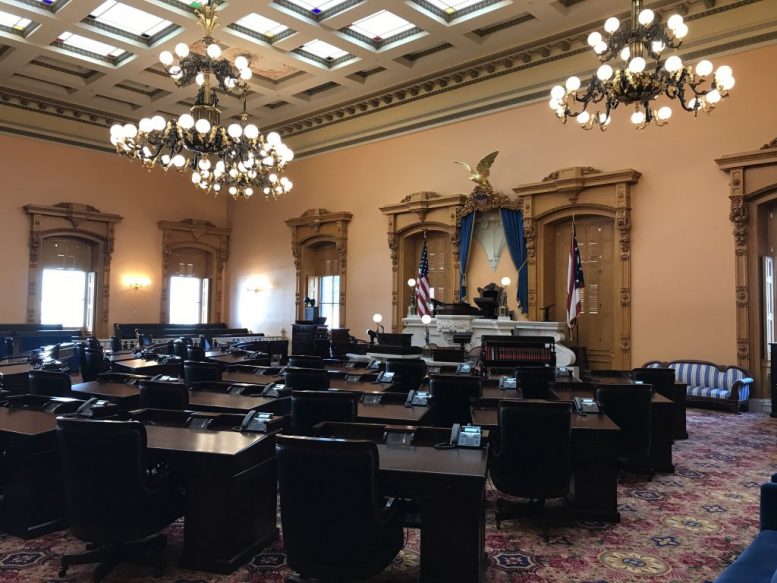A billion-dollar nuclear subsidy was the subject of an intense fight in 2019 and great controversy since. But the president of the Ohio Senate this week predicted that a repeal will make it through the House, Senate and that Gov. Mike DeWine will sign it.
The reason: The company that owns the nuclear reactors no longer wants the money, he said. And that raises serious questions about whether the subsidies were needed in the first place.
The subsidy was the product of House Bill 6, which was supported by State Sen Theresa Gavarone, R-Bowling Green, and State Rep. Haraz Ghanbari, R-Perrysburg. The legislation was passed in 2019 after a nasty fight which led to federal criminal charges against then-House Speaker Larry Householder, four associates and a dark-money group.
Prosecutors said $61 million from Akron-based First Energy and associated groups was used in the corrupt effort to pass the bailout. Two of Householder’s associates and the dark money group have pleaded guilty, FirstEnergy’s CEO was fired and Gov. Mike DeWine’s appointee to chair the Public Utility Commission of Ohio has resigned as part of the scandal.
Despite intense calls for a full repeal of HB 6, it remains in place — although a Franklin County Judge has temporarily stopped collection of the money by the owner of the nuclear plants, FirstEnergy successor Energy Harbor.
DeWine and others have said they want a repeal, but they want to continue to subsidize the Northern Ohio nuclear plants for environmental reasons.
“We were for nuclear power,” he said Tuesday, referring to his initial support for HB 6. “Nuclear power was the only way in this state, today, that we can have very much non-carbon production. It’s the only way we can do it.”
But early this month, Sens. Jerry C. Cirino, R-Kirtland, and Michael Rulli, R-Salem, introduced legislation, Senate Bill 44, to get rid of the subsidies. On Wednesday it received a hearing by the Senate Energy and Public Utilities Committee.
Despite the governor’s statements, Senate President Matt Huffman, R-Lima, said he expects the repeal legislation to become law.
“I think that provision will likely get passed out of the Senate and I think it will pass out of the House and get signed by the governor,” Huffman told the governing board of the Ohio Consumers’ Counsel, the state’s official utility watchdog. “When I say the House and the governor, I’m not speaking for them, nor have I spoken to them about this. But if a large company that got a subsidy in a dubious way… says ‘We don’t want it,’ that seems to me to be a pretty easy call.”
Energy Harbor, the owner of the plants, didn’t respond to requests for comment on Wednesday. But Huffman was apparently referring to a December 2019 ruling by the Federal Energy Regulatory Commission and Energy Harbor’s response to it.
The ruling said, in essence, that the company that would become Energy Harbor would have to cut its prices if it was going to sell its subsidized nuclear energy onto the massive grid that serves all or part of 13 states, including Ohio.
It would “threaten the competitiveness” of the long-term, or “capacity,” marketplace if companies like Energy Harbor could sell subsidized power on the same basis as power that wasn’t subsidized. So Energy Harbor and the others have to discount it according to a formula, the ruling said.
Recent developments appear to be a sharp reversal from 2019.
As proponents pushed HB 6, they threatened that closure of the Ohio nuclear plants was imminent if they didn’t get a bailout — and quickly. But Huffman’s statements on Tuesday indicate that Energy Harbor has no plans to shutter the plants even now that it isn’t getting the money.
“I don’t want the nuclear power plants to close,” he said. “However, it’s been made clear to me that the plants will not close if this subsidy is removed. In fact, they’re better off because of machinations at another level. In fact, these subsidies will likely harm these power plants.”
There’s other evidence that Energy Harbor’s pre-bankruptcy predecessor, FirstEnergy Solutions, might not have been as broke as it claimed in 2019.
Shortly after emerging from bankruptcy in early 2020, it did an $800 million stock buyback. Such buybacks typically raise stock values, in this case enriching shareholders just months after pleading poverty and winning a $1 billion bailout from Ohio ratepayers.
The federal ruling also raises questions about whether it was wise even to start the bailout fight, which has caused so much damage in Ohio. On June 29, 2018, more than a year before DeWine signed HB 6 into law, FERC issued a ruling strongly foreshadowing what it later did: effectively erase the subsidies bailout supporters had gained if they wanted to sell power into the long-term market.
***
Also from Ohio Capital Journal:
Along with health department, state auditor missed 4,000 COVID-19 deaths during probe
The Ohio State Auditor’s months-long investigation into the state health department’s COVID-19 data practices failed to detect the 4,000 newly discovered COVID-19 deaths announced by the Ohio Department of Health last week.
Auditor Keith Faber’s staff have declined to fully explain how they missed the deaths — which sprung Ohio’s death toll from about 12,000 to 16,000 — or what specifically auditors are investigating.
Both ODH and Faber’s auditors alike missed a broad swath of pandemic mortality as Ohio, like every other U.S. state, looked for an appropriate policy response for an infectious disease that principally spreads through person-to-person interaction.
The health department said it first identified a death data problem Feb. 2 before identifying and announcing the finding Feb. 10. Faber’s staff learned about the 4,000 newly discovered deaths that day. READ MORE
Ohio Senate passes bill to let lawmakers strike down health orders
The Ohio Senate approved a bill Wednesday that would give lawmakers the authority to strike down public health orders, potentially setting up yet another pandemic showdown between Gov. Mike DeWine and legislators within his own party.
All 25 votes in favor of Senate Bill 22 came from Republicans, in eluding Sen. Theresa Gavarone, R-Bowling Green, who say the bill would provide legislative oversight of the executive branch’s handling of a health crisis. Eight Democrats in the minority voted against.
Sen. Rob McColley, R-Napoleon, one of the bill’s main sponsors, said again on Wednesday that the legislation is not meant to specifically target DeWine and the Ohio Department of Health (ODH). He and other Republicans argued SB 22 is meant to address broader aims for checks and balances.
“This bill is not meant to be in any way an indictment of any of the policies that have been put in place by the administration over the course of the last 11 months,” McColley said. READ MORE
Added COVID-19 testing on the way with $1.6B from the Biden administration
WASHINGTON — The Biden administration is directing $1.6 billion to bolster COVID-19 testing nationally, including money to expand testing in schools and homeless shelters, boost supplies needed for testing, and analyze results to more quickly identify new strains of the virus.
Roughly $650 million of the sum would go toward creating regional coordinating centers, which will partner with labs that have underused testing capacity. Biden’s COVID-19 advisers said that effort could bring more testing to schools.
His advisers in a briefing on Wednesday described the testing coordination effort as a pilot program, adding that additional money would be needed from Congress to fully scale up the program.
“To be clear, these resources are a significant help in the short term, but they are far from what’s necessary to meet the need for testing in communities across the country,” said Carole Johnson, Biden’s COVID-19 supply coordinator. READ MORE





